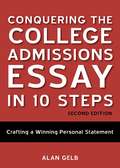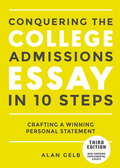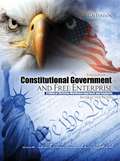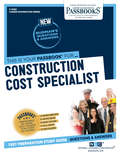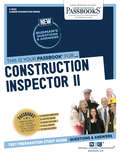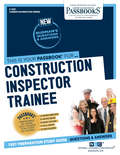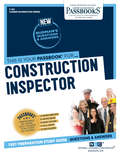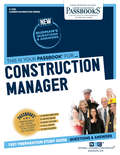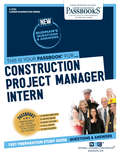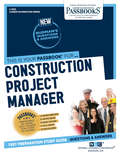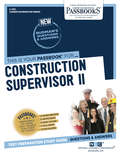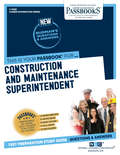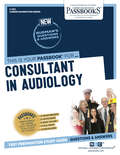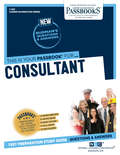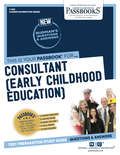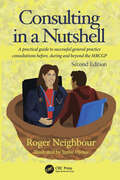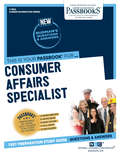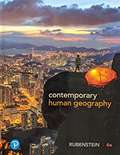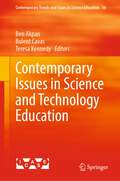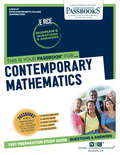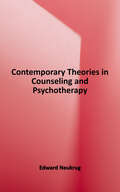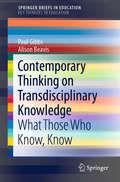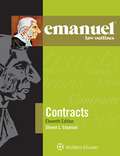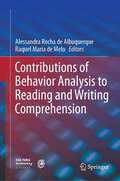- Table View
- List View
Conquering the College Admissions Essay in 10 Steps, Second Edition: Crafting a Winning Personal Statement
by Alan GelbA guide to crafting a meaningful and polished college admissions essay that gets students into the school of their dreams by expressing their unique personality, strengths, and goals.Stand out from the crowd with a memorable, meaningful personal statement that will capture the attention of college admissions officers. Writing a college admissions essay is no easy task--but with college essay coach and New York Times contributor Alan Gelb's accessible and encouraging step-by-step instructions, you'll be able to write an honest, one-of-a-kind essay that really shines. Gelb's ten-step approach has garnered great results for the students who have tried it, many of whom were accepted into their dream schools (Harvard, Brown, Yale, and more). This to-the-point handbook shows you how to identify an engaging essay topic, and then teaches you how to use creative writing techniques to craft a narrative that expresses your unique personality, strengths, and goals. Whether you're an A-student looking for an extra boost or a less-confident writer who needs more intensive help, Gelb's reassuring and concise guidance will help you every step of the way, from your initial draft to final revision. In the end, you will have a well-polished, powerful, and profound personal statement that you can feel proud of--a college essay that doesn't feel "pre-fab," but is a real reflection of your own individuality.
Conquering the College Admissions Essay in 10 Steps, Third Edition: Crafting a Winning Personal Statement
by Alan GelbThe definitive guide to writing an amazing essay and mastering the college applications process.Writing a memorable personal statement can seem like an overwhelming project for a young college applicant, but college essay coach Alan Gelb's organized and encouraging step-by-step instructions take the intimidation out of the process, enabling applicants to craft a meaningful and polished college admissions essay. Gelb teaches students to identify an engaging topic and use creative writing techniques to compose a vivid statement that will reflect their individuality. A consistent top-seller in the college prep category, Conquering the College Admissions Essay in 10 Easy Steps has been revised to include extra information on supplemental and waitlist essays. This much-needed handbook will help applicants win over the admissions dean, while preparing them to write better papers once they've been accepted.For more, visit the author’s website at www.conquerthecollegeessay.com.
Constitutional Government and Free Enterprise: A Biblical Christian Worldview Approach and Emphasis: Interactive Notes
by Gai Ferdon“Constitutional Government and Free Enterprise: A Biblical Christian Worldview Approach and Emphasis, Interactive Notes originated from the need to further equip my own freshman students here at Liberty University with an understanding of the basic core essentials and components of worldviews of the Western tradition, with specific focus on the Biblical Christian worldview and its impact on American history and institutions. After years of teaching worldview studies and similar materials at the undergraduate and even high school levels, I became better acquainted with the intellectual challenges students faced, and decided to create a series of class lecture notes to coordinate with required course texts for an entry-level course designed specifically for government majors within the Helms School of Government. The first set of these lectures was compiled and augmented into a first edition in 2014, and revised again into a second edition in the spring of 2019. This third edition contains more interactive features intended to enhance the readers learning experience.” – from the author’s Preface.
Construction Cost Specialist: Passbooks Study Guide (Career Examination Series)
by National Learning CorporationThe Construction Cost Specialist Passbook® prepares you for your test by allowing you to take practice exams in the subjects you need to study. It provides hundreds of questions and answers in the areas that will likely be covered on your upcoming exam.
Construction Inspector II: Passbooks Study Guide (Career Examination Series)
by National Learning CorporationThe Construction Inspector II Passbook® prepares you for your test by allowing you to take practice exams in the subjects you need to study. It provides hundreds of questions and answers in the areas that will likely be covered on your upcoming exam.
Construction Inspector Trainee: Passbooks Study Guide (Career Examination Series)
by National Learning CorporationThe Construction Inspector Trainee Passbook® prepares you for your test by allowing you to take practice exams in the subjects you need to study. It provides hundreds of questions and answers in the areas that will likely be covered on your upcoming exam, including but not limited to: understanding and interpreting technical instructions and dimensional drawings; interpretation of charts, graphs and tables; basic mathematics, including geometric figures; arithmetic computations; and other related areas.
Construction Inspector: Passbooks Study Guide (Career Examination Series #C-765)
by National Learning CorporationThe Construction Inspector Passbook® prepares you for your test by allowing you to take practice exams in the subjects you need to study. It provides hundreds of questions and answers in the areas that will likely be covered on your upcoming exam.
Construction Manager: Passbooks Study Guide (Career Examination Series)
by National Learning CorporationThe Construction Manager Passbook® prepares you for your test by allowing you to take practice exams in the subjects you need to study. It provides hundreds of questions and answers in the areas that will likely be covered on your upcoming exam.
Construction Project Manager Intern: Passbooks Study Guide (Career Examination Series)
by National Learning CorporationThe Construction Project Manager Intern Passbook® prepares you for your test by allowing you to take practice exams in the subjects you need to study. It provides hundreds of questions and answers in the areas that will likely be covered on your upcoming exam, including but not limited to: construction techniques, materials, equipment and methodology; safety practices; contracts, plans and specifications; basic mathematics; record keeping; and more.
Construction Project Manager: Passbooks Study Guide (Career Examination Series)
by National Learning CorporationThe Construction Project Manager Passbook® prepares you for your test by allowing you to take practice exams in the subjects you need to study. It provides hundreds of questions and answers in the areas that will likely be covered on your upcoming exam.
Construction Supervisor II: Passbooks Study Guide (Career Examination Series)
by National Learning CorporationThe Construction Supervisor II Passbook® prepares you for your test by allowing you to take practice exams in the subjects you need to study. It provides hundreds of questions and answers in the areas that will likely be covered on your upcoming exam.
Construction and Maintenance Superintendent: Passbooks Study Guide (Career Examination Series)
by National Learning CorporationThe Construction and Maintenance Superintendent Passbook® prepares you for your test by allowing you to take practice exams in the subjects you need to study. It provides hundreds of questions and answers in the areas that will likely be covered on your upcoming exam, including but not limited to: practices, processes and material used in general building maintenance and construction work; crafts and trades employed in general construction work; use of construction and maintenance equipment and machinery; proper safety practices and procedures, including pertinent Federal, state and local laws and regulations; personnel rules and practices; and more.
Consultant in Audiology: Passbooks Study Guide (Career Examination Series)
by National Learning CorporationThe Consultant in Audiology Passbook® prepares you for your test by allowing you to take practice exams in the subjects you need to study. It provides hundreds of questions and answers in the areas that will likely be covered on your upcoming exam, including but not limited to: audiology, aural rehabilitation, and various techniques of administering and interpreting audiological tests for adults and children; speech therapy, speech tests and methods of determining causes of speech defects; development of speech, hearing, and language in normal and hearing-impaired children; interprofessional relationships and coordination of information from diverse specialists; role of paraprofessionals; principles and practices of supervison and training; and other related areas.
Consultant: Passbooks Study Guide (Career Examination Series #C-2740)
by National Learning CorporationThe Consultant Passbook® prepares you for your test by allowing you to take practice exams in the subjects you need to study. It provides hundreds of questions and answers in the areas that will likely be covered on your upcoming exam, including but not limited to: Early childhood education; Written communication; Analysis of information; and more.
Consultant: Passbooks Study Guide (Career Examination Series #C-2740)
by National Learning CorporationThe Consultant (Early Childhood Education) Passbook® prepares you for your test by allowing you to take practice exams in the subjects you need to study. It provides hundreds of questions and answers in the areas that will likely be covered on your upcoming exam, including but not limited to: Early childhood education; Written communication; Analysis of information; and more.
Consulting in a Nutshell: A practical guide to successful general practice consultations before, during and beyond the MRCGP
by Roger NeighbourPraise for the first edition: ‘…a unique book, written by a unique GP. There is no one better placed to pull together decades of learning and experience on how to achieve the greatest success in the general practice consultation. The relaxed pace of writing, the accessible examples, the clear narrative and the engaging anecdotes make this a resource that is accessible and useful to all who seek to improve their clinical consulting skills.’ Helen Stokes-Lampard, former Chair of the Royal College of General Practitioners ‘Excellent and easy to remember structure; this is the approach I’ll use daily.’ GP ST3 The second edition of this well-received book, fully revised to reflect changes to the RCGP Membership examination, helps GPs to establish ways of thinking, talking and behaving in the consultation that are most likely to lead to good outcomes. It describes a simple three-part approach to the consultation’s essential task, which is to convert a patient’s problem into a plan acceptable to both patient and doctor. It combines reader-friendly explanations, helpful illustrations and examples from everyday practice. Consulting in a Nutshell will help GPs at every career stage – from medical student to SCA candidate to experienced practitioner – to analyse, develop and grow their personal consulting style. At a time of ongoing and profound change in primary care, it aims to ensure that seeing patients and having good consultations becomes and remains a source of satisfaction and fulfilment.
Consumer Affairs Specialist: Passbooks Study Guide (Career Examination Series)
by National Learning CorporationThe Consumer Affairs Specialist Passbook® prepares you for your test by allowing you to take practice exams in the subjects you need to study. It provides hundreds of questions and answers in the areas that will likely be covered on your upcoming exam, including but not limited to: interviewing; evaluating conclusions in light of known facts; reading of meters, scales and gauges; understanding and interpreting tabular material; understanding and interpreting written material; and other related areas.
Contemporary Human Geography
by James M. RubensteinThe fourth edition of Contemporary Human Geography builds on the strengths of the first three editions, while responding to user feedback to make important changes and improvements, and incorporating innovative features, current data, and new information. This edition brings substantial changes in both organization and content, as well as updated information and data. Especially important is the consideration of digital as well as paper versions of the book. This book has been designed to be legible--and attractive--in either paper or electronic format. Several features integrated into the text enhance student understanding and analytic skills.
Contemporary Issues in Science and Technology Education (Contemporary Trends and Issues in Science Education #56)
by Teresa Kennedy Ben Akpan Bulent CavasThis edited volume discusses major issues in present-day science and technology education (STE). It is divided into three thematic sections: philosophical foundations and curriculum development; sustainable development, technology and society; and the learning sciences and 21st century skills. Section I examines the history and future of STE curriculum development, along with specific issues within this dynamic area. Section II explores sustainable development in three important aspects: economic development, social development, and environmental protection. Section III covers the 21st century skills that are of overarching importance to the success of learners in school and the world of work. Anchoring each chapter is an assemblage of veteran science and technology education specialists selected from across the world. The book’s target is a worldwide audience of undergraduate / post-graduate students and their teachers, as well as researchers. This book’s exploration of the ever-increasing advances in STE and its narrative writing style will be of interest to a broad range of readers.
Contemporary Mathematics: Passbooks Study Guide (Excelsior/Regents College Examination Series)
by National Learning CorporationThe Excelsior/Regents College Examinations (E/RCE) offer you an opportunity to obtain recognition for college-level learning and consists of exams designed to demonstrate achievement and mastery of various college-level subjects, such as the Arts and Sciences, Business, Criminal Justice, Education, Health and Nursing. The E/RCE Contemporary Mathematics Passbook® prepares you by sharpening knowledge of the skills and concepts necessary to succeed on the upcoming exam and the college courses that follow. It provides a series of informational texts as well as hundreds of questions and answers in the areas that will likely be covered on your upcoming exam.
Contemporary Theories in Counseling and Psychotherapy
by Edward NeukrugThis book provides readers with a comprehensive introduction to cutting-edge therapeutic approaches that are widely revered and used, but generally not included within traditional counseling theories textbooks. Readers learn theories that will not only keep their knowledge current in an evolving field, but also will help to improve and support the ongoing development of their personal practice. The text features contributed chapters written by scholars in the discipline that cover the following contemporary theories: contemporary psychodynamic therapy (CPT); contemporary person-centered counseling (CPCC); cognitive behavioral therapy (CBT); integrative post-modern therapy (IPMT: narrative, solution-focused, relational-cultural); dialectical behavior therapy (DBT); acceptance and commitment therapy (ACT); motivational interviewing (MI); positive counseling; neuro counseling (including EMDR); and complementary, alternative, and integrative modalities (CAM). <p><p>Each chapter presents the history of the theory, critical views of human nature, key concepts, and techniques, and an overview of the counseling process. Social and cultural issues and the efficacy of each theory are discussed. Each chapter concludes with a vignette that demonstrates a client experiencing the counseling approach, followed by questions to pique students' interest. Video demonstrations of select theories are included. A thoroughly modern and critical resource, Contemporary Theories in Counseling and Psychotherapy is ideal for courses focusing on current theories of counseling and psychotherapy. It's also an excellent supplementary resource for courses on classical theory.
Contemporary Thinking on Transdisciplinary Knowledge: What Those Who Know, Know (SpringerBriefs in Education)
by Paul Gibbs Alison BeavisHow can we understand what a transdisciplinary (TD) approach might actually comprise of, given its complex and various uses? This book asks the question of leading practitioners in the field of higher education and transdisciplinarity. The emergence of transdisciplinarity has been a response to the often-failed closed-system, discipline-based approaches to solving complex social problems (various reports and definitions may be found in projects reported by the OECD, UNESCO and EU). These failures are often contingent upon disaggregated notions of epistemology and the compounding failures of ontological incongruities that are evident in these discipline-based approaches. Such approaches are not necessarily confined to large, seemingly insurmountable social problems, but apply equally well to issues in educational institutions as workplaces. Transdisciplinary knowledge is in the liberation of new and imaginative understanding of the structured reality of open social systems. It gives rise to generative mechanisms, which are central to relationships of agency and structure.
Contracts (The Emanuel Law Outlines)
by Steven L. EmanuelThe most trusted name in law school outlines, Emanuel Law Outlines support your class preparation, provide reference for your outline creation, and supply a comprehensive breakdown of topic matter for your entire study process. Created by Steven Emanuel, these course outlines have been relied on by generations of law students. Each title includes both capsule and detailed versions of the critical issues and key topics you must know to master the course. Also included are exam questions with model answers, an alpha-list of cases, and a cross reference table of cases for all of the leading casebooks.
Contracts: A Context and Practice Casebook, 3rd ed
by Michael Hunter Schwartz Adrian J. WaltersEvery chapter in this innovative casebook places students in roles as practitioners handling simulated law practice problems; provides context in the form of an overview of the law, similar to that which an attorney would read before reading cases in a new subject area; includes questions designed to encourage students to find the applicable statutes and cases on point in the state where the student is planning to practice law; includes exercises, visual aids, and case reading scaffolds, designed to engage students with a wide range of learning styles; and ends with professionalism questions addressing ethical and professional identity questions suggested by the materials in the chapter. The third edition of Contracts: A Context and Practice Casebook reflects an effort to move the book and accompanying teaching materials into the next generation. Like prior editions of the book, the third edition adopts a learner-centered approach and draws deeply from modern brain science. The book contains dozens of problems, many of which the authors created in collaboration with practicing attorneys, and, the very extensive teacher's manual, includes learning objectives for each doctrinal area, dozens of multiple-choice questions, and detailed teaching notes. This new edition includes the integration of the multiple-choice questions, which have been substantially revised with Carolina Academic Press's Core Knowledge software, and the use of color throughout the book, which adds visual interest, promotes clarity and provides emphasis.
Contributions of Behavior Analysis to Reading and Writing Comprehension
by Alessandra Rocha de Albuquerque Raquel Maria de MeloThis book shows how behavior analysis can be applied to teaching reading and writing to primary school students and to special populations, such as children with intellectual and hearing disabilities and illiterate adults. Originally published in Portuguese, this contributed volume is now translated into English and presents for the first time to international researchers and students a comprehensive overview of a research program developed for more than three decades in Brazil which gave birth to a unique teaching program based on the concept of stimulus equivalence: the Learning to Read and Write in Small Steps. The book is divided into four parts. The first part presents the theoretical framework and the historical context in which the teaching program was developed by the group led by Drs. Julio Cesar de Rose and Deisy das Graças de Souza, currently organized in the National Institute of Science and Technology on Behavior, Cognition, and Learning (INCT/ECCE). The second part describes the modules that make up the Learning to Read and Write in Small Steps teaching program. The third part presents results of empirical research conducted with children with intellectual and hearing disabilities and illiterate adults. Finally, the fourth part presents contributions from other areas of knowledge – such as speech therapy, linguistics, and education – to the understanding of reading and writing and possible dialogues between them and behavior analysis. Contributions of Behavior Analysis to Reading and Writing Comprehension will be of interest to researchers and students in the fields of psychology and education interested in the application of behavior analysis to teaching and learning processes. It will also be a valuable resource for professionals directly working in educational institutions, such as elementary school teachers and psycho-pedagogues. The translation of the original manuscript in Portuguese was done with the help of artificial intelligence. The present version has been revised technically and linguistically by the authors in collaboration with a professional translator.
